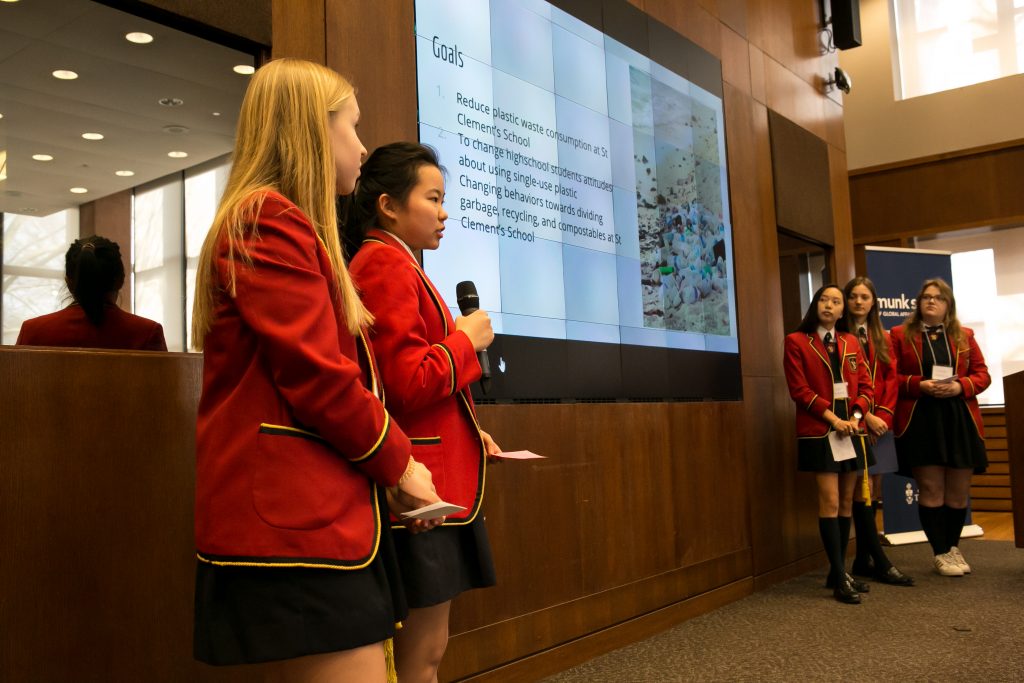
Global Ideas Institute gets ready for international cohort
For Sharon Low, a Master of Global Affairs student in her first year at the Munk School of Global Affairs & Public Policy, there’s one activity that she says is particularly meaningful in her stacked schedule of extracurriculars.
Serving as a mentor for the Munk School’s Global Ideas Institute (GII), she says, “is a full circle moment,” and a chance for her to help teach high school students how to think of practical solutions to real global issues. It’s also an exciting time for GII, Low notes, as the program, formerly exclusive to students in Toronto, is expanding to include more schools in Canada and abroad.

Low first became involved in GII in high school. Originally on a STEM-focused track, she says the program, which pairs high schoolers with master’s students from the Munk School as well as other programs at the University of Toronto, helped shape her studies to include international relations.
Each year, GII coordinates monthly discussions and guest speakers focused on a thematic global issue, such as plastic waste, or online misinformation. The initiative goes beyond the typical lecture format, challenging students to develop an innovative solution to address the problem.
At the end of the year, students present their solutions to a panel of judges, and some groups even go on to build their business or social enterprise after the school year ends.
In Low’s high school GII cohort, her group worked with their mentor to develop and present a solution to address challenges in birth registration for stateless populations.
Hannah Ahamedi, another mentor for the 2021-2022 cycle, also took part in GII in high school. Her group focused on food insecurity in remote communities.
Ahamedi says that it was her GII mentors who inspired her to pursue a post-secondary education in Peace, Conflict, and Justice studies at the Munk School.
“I was so inspired by the work my mentors did, and their desire to have an impact on the people around them. I want to be able to give that mentorship to other students now, to show them that they’re capable and that they can do anything when they have a strong, passionate community around them.”
This year, Low and Ahamedi will work with high school students to address the health inequities that have emerged during the COVID-19 pandemic. The program will also include mentors from the University of Toronto’s Faculty of Education, and the Dalla Lana School of Public Health, adding to the multidisciplinary approach of the program.
In addition, Low and Ahamedi will have the chance to be mentors for the first global cohort of GII, as the program expands to include students from Alberta, the United States, Germany, and Denmark. In total, over one hundred high school students are expected to take part in the program’s 12th year, bringing a diversity of experiences and backgrounds to the challenges put forward.

Zach Johnston, a 2020 graduate of the Master of Global Affairs program who is now serving as GII’s director, says that the experience moving GII online during the pandemic helped make the expansion, long-considered, a reality.
“GII is something I would have loved to have had access to when I was in high school – a taste of what university has to offer, and the experience to learn about innovation,” says Johnston. “Now by going digital, we can share it with even more students.”
Low adds that the incoming cohort will have a different approach to collaboration, and a unique perspective on the topic of inequities stemming from the pandemic, as a result of the international mix in the program, and from doing a large portion of their high school experience online.
“This generation is very different, from even mine, because they’ve been learning so much online. I’m curious about how different their learning style is and what they’ll think up.”
Ahamedi is similarly excited to see how her group engages with this year’s theme. While the highlight of the program for some is the end-of-year presentation, Ahamedi is most looking forward to the very beginning stage: getting to know her group.
“I’m so excited to meet my mentees and see their passions and interests,” she says. “GII was the reason I’m doing what I’m doing now, and it really propelled me to make positive changes in my life.”

